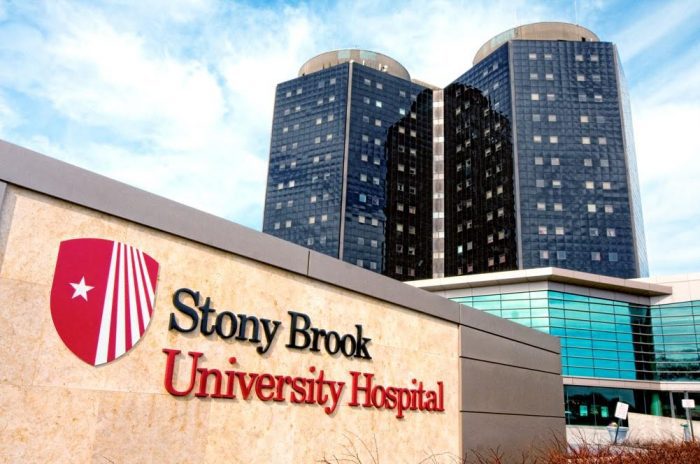Stony Brook Heart Institute among first in nation to perform leading-edge blood pressure treatment
The Stony Brook Heart Institute at Stony Brook University Hospital is expanding its advanced treatment options for those with high blood pressure. The Heart Institute is among the first in the nation to perform ultrasound renal denervation — a groundbreaking, minimally invasive technique to treat high blood pressure for those with resistant hypertension. Resistant hypertension is a form of elevated blood pressure that does not respond to lifestyle changes or medication.
“Our first renal denervation patient had been treated for high blood pressure for many years and was looking to reduce the number of medications as well as the side effects,” says John Reilly, MD, interventional cardiologist at Stony Brook Medicine, Chief of Cardiology at Stony Brook Southampton Hospital, and was the principal investigator at Stony Brook Medicine for the technology used in the procedure. Dr. Reilly performed the first case at Stony Brook University Hospital. “The procedure, lasting about 75 minutes, went smoothly and I’m happy to report that the patient went home the very same day.”
The new technology that was used in the procedure is specifically designed to rein in the blood pressure of those with resistant hypertension. Called the Paradise® Ultrasound Renal Denervation (RDN) system and approved by the FDA on November 7, involves applying ultrasound energy in the renal artery to ablate the nerves that run just outside the artery. This ablation interrupts the nerves communicating between the kidneys and central nervous system, which brings the blood pressure under better control. Stony Brook University Hospital is the first on Long Island to use this specific technology and was one of only a select number of centers nationwide to have participated in the RADIANCE CAP trial that demonstrated the safety and effectiveness prior to FDA approval.
“Durable and effective therapy for hypertension that may reduce the need for life-long treatment with medications is a milestone in the treatment of this disease,” says Robert Pyo, MD, Director, Interventional Cardiology and Medical Director, Structural Heart Program at Stony Brook Medicine and Associate Professor, Renaissance School of Medicine at Stony Brook University. “In the hands of our expert Heart Institute team — everyone from our cardiac researchers, imagers and interventional cardiologists — we are continuously seeking the most innovative solutions for our patients.”
Over 122 million Americans have high blood pressure (HBP), which is one of the most important risk factors for cardiovascular disease including heart attacks and stroke. Reducing blood pressure by 10mmHg can reduce the risk of stroke by 27%. Three quarters of Americans with HBP do not have their condition under control, and twenty percent of those Americans whose blood pressure is uncontrolled do not respond to lifestyle modification or medications, and up until now had no other treatment options.
“Pioneering research allows Stony Brook University Hospital the ability to offer patients additional options when their current treatments are not working,” said Hal Skopicki, MD, PhD, Co-Director, Stony Brook Heart Institute and Chief, Cardiology at Stony Brook Medicine and Ambassador Charles A. Gargano Chair, Cardiology, Renaissance School of Medicine at Stony Brook University. “It is an exciting and transformative time both for cardiovascular patients and the medical community.”
“Our ever-growing program continues to raise the bar for cardiovascular care on Long Island, allowing us to provide our community with a full array of options to diagnose and treat the most complex of cardiovascular conditions. Renal denervation is a unique opportunity to treat patients with hypertension and represents an entirely different treatment form for hypertension that is resistant to medical treatment. I couldn’t be prouder of our team that remains focused on delivering the best-in-outcomes for our patients,” says Apostolos Tassiopoulos, MD, Chair, Department of Surgery; Chief, Division of Vascular and Endovascular Surgery, Stony Brook Medicine and Professor of Surgery, Renaissance School of Medicine at Stony Brook University.
To learn more about the Renal denervation (RDN) procedure and the team at the Stony Brook Heart Institute, visit heart.stonybrookmedicine.edu.
About Stony Brook Heart Institute:
Stony Brook Heart Institute is located within Stony Brook University Hospital as part of Long Island’s premier university-based medical center. The Heart Institute offers a comprehensive, multidisciplinary program for the prevention, diagnosis and treatment of cardiovascular disease. The staff includes full-time and community-based, board-certified cardiologists and cardiothoracic surgeons, as well as specially trained anesthesiologists, nurses, physician assistants, nurse practitioners, respiratory therapists, surgical technologists, perfusionists, and other support staff. Their combined expertise provides state-of-the-art interventional and surgical capabilities in 24-hour cardiac catheterization labs and surgical suites. And while the Heart Institute clinical staff offers the latest advances in medicine, its physician-scientists are also actively enhancing knowledge of the heart and blood vessels through basic biomedical studies and clinical research. To learn more, visit www.heart.stonybrookmedicine.







